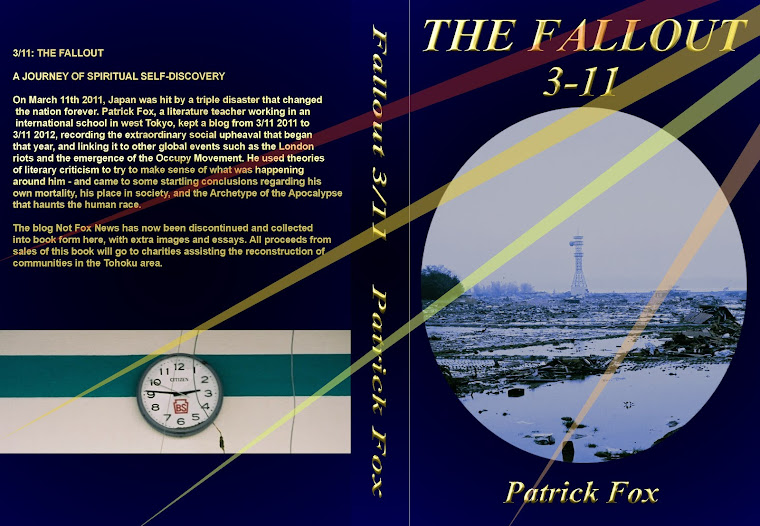On 25th November 1970, right-wing
novelist Yukio Mishima was the last person to commit the ritual samurai suicide
known as 'Seppuku'. He drove into the SDF army garrison at Ichigaya, Tokyo with
his gang of private bodyguards (known as the Shield Society), took the
commanding officer hostage, and called on the troops present to overthrow the
government and return Japan to 'traditional discipline and values'.
Mishima's attempted coup failed,
but forty-three years later, we have a similar situation - less dramatic, but infinitely
more dangerous.
This week, Prime Minister Shinzo
Abe is rushing new State Secrecy legislation through the Lower House with no referendum, no public debate, and
hardly any press coverage. It will give the government further powers to arrest
and imprison anyone who disagrees with what the Government is trying to do.
Most of the bill's contents are
preoccupied with the security of the nuclear power industry, because a) Abe wants
to switch the atomic plants back on as quickly as possible and b) he wants the
power to eliminate whistle blowers who try to warn the public of existing
safety problems.
Why the big hurry to restart the nuclear
program, while the Fukushima plant is still in such a fragile condition?
Because Japan has almost no fossil fuels of
its own. It has deliberately neglected research into renewable energy sources
because it's been in bed with the nuclear lobbyists for decades. Since 3/11.
Japan has been importing energy, which has inceased its trade deficit (it has
the world's largest national debt at one quadrillion yen - that's USD 10.5
trillion). This is crippling Abe's attempts at economic revival. In a situation
like this, any country has two choices; generate the power at home (nuclear
power being the only option) or go and get the reserves from elsewhere.
This second choice has caused the current
territorial dispute with China concerning the uninhabited Senkaku Islands and
the oil and gas reserves said to lie beneath them. On 22nd November, China
announced an "air defense identification zone" covering the disputed
islands, bringing Japan and China one step closer to armed conflict.
In the current Parliamentary sessions, Abe is overtly attacking
three pillars of Japanese democracy: the 1946 Constitution which renounces war,
the education law which puts a curb on nationalism, and the security treaty
with the United States. Two of his allies are the Shinto Association of
Political Leadership, and the Shinto Political Alliance Diet Members’ Association,
which are determined to restore “traditional Japanese spiritual values.”
By “traditional Shinto”, of course, they mean the early 20th
Century. If we go back a couple of
thousand years to the origins of Shinto, we find it was an animist, nature-based
faith similar to Celtic Paganism. Shinto taught every material thing, every
tree, every stone, every river, held a spark of the divine (a Kamisama) and the
lives of human beings were linked to the earth by a system of festivals and
ceremonies. The emphasis on the Emperor as religious and military head of state
was only added recently, after the Meiji Restoration of 1868.
Now fast-forward to 2013,
and ‘nature’ is as stunted as a bonsai tree, and rural Japan is covered from
coast to coast by concrete roads and dams, overhead power lines, electrical
pylons, and decaying farm buildings, creating one of the ugliest-looking
countries in the world.
This rapid slide from conservatism
to fascism was triggered by 3/11. It didn't start it, but it sure did accelerate
it. Nobody can predict how such 3/11-style 'Black Swan' events (as they are
called by economists) will affect the world in the future. The Philippines has
suffered one of the most tragic and devastating typhoons in global history. The
aftermath of Superstorm Sandy is a very real problem for many New Yorkers, one
year on. Japan’s own
coast has been hit by fatal storm surges in the past (which are separate from
tsunamis), the last one being at Ise Bay in 1959. There is a very real
possibility that you, the person reading this, will be caught up in a natural
disaster at some point in the future - and then you'll find out whether the
Government can help you or not.
If you're fine with that, or if
you think Japan is such an insignificant nation that it doesn't matter what it
gets up to, then stop reading now. If what you've read makes you concerned, or
worried, then read the next blog post - titled "Official Secrets".


No comments:
Post a Comment